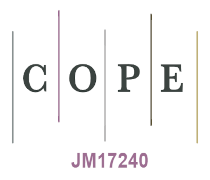Edinburgh postnatal depression scale - psychometric properties and characteristic
DOI:
https://doi.org/10.18778/1427-969X.17.03Keywords:
postpartum depression, diagnosis, psychometric properties, Edinburgh Postnatal Depression Scale (EPDS)Abstract
Objectives: estimation of psychometric properties of the Polish version of the Edinburgh Postnatal Depression Scale (EPDS) to recognize the symptoms of postpartum depression. Material and methods: The study was conducted from 2007 to 2011. One hundred twenty six women after childbirth were examined. The mean age was 28,34 years (SD = 3,96). The Scale was administered between the 4th and 12th weeks after delivery (M = 6,56 weeks; SD = 2,14) to mothers, recruit ed previously at the gynecological clinics and prenatal classes. All participants were submitted to a structured interview for postpartum depression diagnosis. Participants completed Polish version of EPDS and Beck Depression Inventory (BDI) to verify the reliability and validity of the Polish version of EPDS. To assess psychometric properties of the scale, descriptives statistics, independent and dependent t-test, Cronbach’s alpha, Pearson’s correlation, exploratory factor analysis (with KMO-test) were conducted. The scale sensitivity and specificity were calculated, and the receiver operating characteristic (ROC) curve was used to find the best cut-off point. Results: Using the factor analysis two factor were extracted, which accounted for 68,5% of the variance. Cronbachʼs alpha coefficient for the entire scale is high and amounts to 0,91. Stability factor estimated by test-retest was 0,761 (p < 0,05). Total scores of EPDS correlated significantly with the results of the BDI (r = 0,836, p < 0,01). Using 13/14 as the cut-off point, the scale’s sensitivity was 96%, the specificity was 93%. Conclusions: The good psychometric properties of the Polish version of the EPDS were confirmed in the present study. The results of the reliability of the Polish version of EPDS, do not differ from results obtained in other validation studies in the world. Polish version of the scale meets the basic psychometric criteria and can be successfully used to identify symptoms of postnatal depression.
References
Beck, A.T., Ward, C.H., Mendelson, M., Mock, J., Erbaugh, J. (1961). An inventory for measuring depression. Archives of General Psychiatry, 4, 561–571.
Google Scholar
Beck, A.T., Steer, R.A., Garbin, M.G. (1988). Psychometric properties of the Beck Depression Inventory: twenty-five years of evaluation. Clinical Psychology Review, 88, 77–100.
Google Scholar
Beck, C.T., Indman, P. (2005). The many faces of postpartum depression. Journal of Obstetrics and Gynecology Neonatal Nursing, 34 (5), 569–576.
Google Scholar
Besser, A., Priel, B., Wiznitzer, A. (2002). Childbearing depressive symptomatology in high-risk pregnancies: the role of working models and social support. Personal Relationships, 9, 395–413.
Google Scholar
Bielawska-Batorowicz, E. (1995). Determinanty spostrzegania dziecka przez rodziców w okresie poporodowym. Łódź: Wydawnictwo Uniwersytetu Łódzkiego.
Google Scholar
Bielawska-Batorowicz, E. (2006). Psychologiczne aspekty prokreacji. Katowice: Wydawnictwo Naukowe Śląsk.
Google Scholar
Boath, E.H., Pryce, A.J., Cox, J.L. (1998). Postnatal depression: the impact on the family. Journal of Reproductive and Infant Psychology, 16, 199–203.
Google Scholar
Bunevicius, A., Kusminksas, L., Bunevicius, R. (2009). Validation of the Lithuanian version of Edinburgh Postnatal Depression Scale. Medicina, 45 (7), 544–548.
Google Scholar
Chrzan-Dętkoś, M., Dyduch-Maroszek, A., Humięcka, A., Karasiewicz, K. (2012). Uwarunkowania i konsekwencje depresji poporodowej. Psychoterapia, 2 (161), 55–63.
Google Scholar
Cox, J.L., Holden, J.M., Sagovsky, R. (1987). Detection of postnatal depression. Development of the 10-item Edinburgh postnatal depression scale. British Journal of Psychiatry, 150, 782–786.
Google Scholar
Cox, J.L., Holden, J.M. (2003). Perinatal mental health: A guide to the Edinburgh Postnatal Depression Scale (EPDS). London: Gaskell.
Google Scholar
Gausia, K., Fisher, C., Algin, S., Oosthuizen, J. (2007). Validation of the Bangla version of the Edinburgh Postnatal Depression Scale for Bangladeshi sample. Journal of Reproductive and Infant Psychology, 25 (4), 308–315.
Google Scholar
Kendall-Tacket, K.A. (2005). Depression in new mothers: Causes, consequences, and treatment alternatives, New York: Haworth Maltreatment and Trauma Press.
Google Scholar
Kheirabadi, G.R., Maracy, M.R., Akbaripour, S., Masaeli, N. (2012). Psychometric Properties and Diagnostic Accuracy of the Edinburgh Postnatal Depression Scale in a Sample of Iranian Women. Iranian Journal of Medical Sciences, 37 (1), 32–38.
Google Scholar
Kossakowska-Petrycka, K., Walęcka-Matyja, K. (2007). Psychologiczne uwarunkowania wystąpienia depresji poporodowej u kobiet w ciąży o przebiegu prawidłowym i ciąży wysokiego ryzyka. Ginekologia Polska, 78 (7), 544–548.
Google Scholar
Lanes, A., Kuk, J.L., Tamim, H. (2011). Prevalence and characteristics of Postpartum Depression symptomatology among Canadian women: a cross-sectional study. BMC Public Health, 11:302, doi:10.1186/1471-2458-11-302.
Google Scholar
Mazhari, S., Nakhaee, N. (2007). Validation of the Edinburgh Postnatal Depression Scale in an Iranian sample. Archives of Women’s Mental Health, 10, 293–297.
Google Scholar
Nonacs, R., Cohen, L.S. (1998). Postpartum mood disorders: diagnosis and treatment guidelines. Journal of Clinical Psychiatry, 59 (2), 34–40.
Google Scholar
O’Hara, M., Swain, A. (1996). Rates and risk of postpartum depression – a meta analysis. International Review of Psychiatry, 8, 37–54.
Google Scholar
Robinson, G.E., Stewart, D.E. (2001). Postpartum disorders. [W:] N.L. Stotland, D.E. Stewart (red.), Psychological aspects of womenʼs health care (s. 117–139). Washington: American, Psychiatric Press, Inc.
Google Scholar
Tronick, E., Reck, C. (2009). Infants of depressed mothers. Harvard Review of Psychiatry, 17 (2), 147–156.
Google Scholar
Downloads
Published
How to Cite
Issue
Section
License

This work is licensed under a Creative Commons Attribution-NonCommercial-NoDerivatives 4.0 International License.








